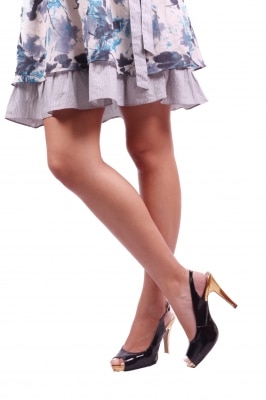Orthopedics: High Heels and Bunions

The Tenuous Connection Between Bunions and High Heels.
Typically, when a female patient goes to the doctor to discuss her bunions, the doctor puts the blame squarely on the female patient. In other words, the doctor states that the bunions are entirely the fault of the patient, because she wore, or wears, high heel shoes.
In my opinion, this is like telling an overweight patient that their tight belt caused the weight gain. Now, the patient probably feels the tight belt more as they gain weight. The belt is certainly associated with a tight feeling across the abdomen and related to the weight gain; the belt is also certainly not the cause of the weight gain.
Just like gaining weight will make a patient feel a tight belt more, developing a bunion will make a patient feel tight high heel shoes more. We all enjoy wearing high heels and enjoy the slimming effect they have on our legs and buttocks. I do not think that any female should be told she can’t wear high heels because she has bunions. Rather, the bunions should be dealt with in a manner that allows the patient to have less pain while wearing high heels.
If there is an effect from shoes, it is probably an effect from all types of shoes, presuming they are tight about the toes. A population study from an island population that had un-shod persons showed that any type of shoe wear for years would increase the incidence of bunions; the increase was in men and women and did not involve high heels. If this study is to be believed, then logically, simply applying a counterforce at night (brace) while sleeping should have the exact opposite effect that shoes have on the foot. That is, if shoes stretch the toe into a bunion, then a brace could potentially stretch it out fo the bunion.
More often than not, bunions are genetic. In my own patient population, about 70% of people with bunions have a parent with bunions and the other 30% have a grandparent with bunions. Although we have not definitively found the specific mutation associated with bunions, rest assured it will be found soon and you will probably be able to buy the test for thousands of dollars. There is a study that looked at 350 people and found that there was a family history of bunions present 90% of the time. The problem of bunions (hallux valgus) is currently considered to be autosomal dominant with incomplete penetrance and associated with the female gender.
Should you have a painful bunion and wish to continue wearing high heel shoes, please don’t give up! I am committed to joint-preservation bunion surgeries and treatments that can correct the problem and still allow personal preference in shoe wear.
Image courtesy of David Castillo Dominici / FreeDigitalPhotos.net
Dr. Meredith Warner is a board certified, Fellowship Trained Foot and Ankle, Orthopedic surgeon practicing in Baton Rouge, Louisiana. Dr. Warner is committed to offering her patients an accurate diagnosis along with a comprehensive treatment plan in order to get them back to a pain free life. Dr. Meredith Warner specializes in the treatment of orthopedic issues, providing operative and non-operative treatment plans of orthopedic problems, including musculoskeletal pain such as chronic back, neck and foot pain, reconstructive surgery of the foot and ankle, arthritis, diabetic, hammer toe, bunion, wound care, work injuries, fitness and nutrition and osteoporosis issues.




